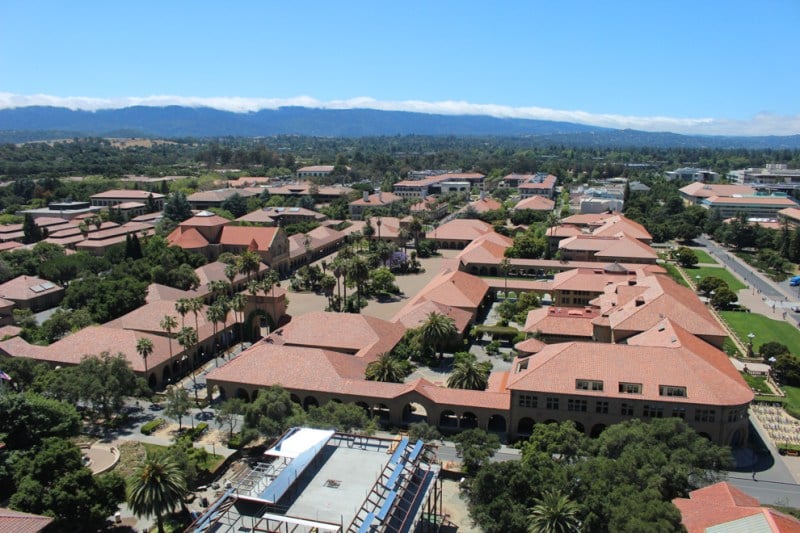The Board of Trustees convened earlier this week for its second meeting of the academic year, discussing Congressional tax proposals and their possible effects on higher education as well as the University’s land-use plans.
Of primary concern to the Board was the detrimental impact that both the House and Senate’s recently-passed tax proposals would have on Stanford’s budget. In order to finance other tax cuts, Republican representatives and senators have proposed a 1.4 percent tax on endowment income for the wealthiest universities — a category that would include Stanford. As the trustees learned, the imposition of this tax would cost Stanford about $25 to $40 million dollars per year — the equivalent of 500 to 800 scholarships.
Jeff Raikes ’80, who began serving as chair of the Board this summer, criticized the tax plan for its potential to reduce students’ accessibility to financial aid, not only at Stanford but at all of the country’s top universities.
“The 30 universities that are being targeted… have been the most generous in applying financial aid because of how effectively we use investment income from the endowment to support education and research,” he said.
The House tax plan would also take a serious financial toll on graduate students by turning their tuition waivers into taxable income. Though this provision to change tuition waivers is not present in the Senate bill, Raikes said that the trustees are “trying to be vigilant” on the issue of graduate student finances.
Graduate students as well as University administrators have both been advocating against the proposed tax overhaul. On Thursday, amid growing student concerns, the Provost and Vice Provost for Graduate Education fielded questions at a town hall, and the Graduate Student Council along with other campus groups have rallied in opposition to the bills.
Raikes stressed that Stanford needs to “make the case that education and research really are very critical parts of the economic success of our country – on supporting the health, culture, and the opportunities for young people.”
“We’re going to do what we can to stay on top of this and try to make sure that whatever is the final bill coming out of Congress…it is more supportive of higher education than the current bill,” he added.
The trustees also provided preliminary feedback on the status of Stanford’s long-range planning process, through which the University solicited input from its various stakeholders last year. Steering groups focused on different aspects of Stanford and composed of faculty, deans and other members of University leadership have now consolidated the 2,800 ideas submitted through the long-range planning process into “white papers”; the steering groups have presented these white papers to the Executive Cabinet of the University and plan to publish their work for the community in February.
“[The long-range planning process] has been a very inclusive, crowd-sourced approach that has generated so many ideas and proposals,” Raikes said, adding that the Board plans to spend its April retreat focused on the plan’s next steps.
Additionally, the Board discussed Stanford’s application for an updated Santa Clara County General Use Permit, or GUP, which would allow Stanford to use its land for the construction of new housing and academic buildings from 2018 to 2035.
As a part of the process, Stanford must submit an Environmental Impact Report on its proposed land use; the University is currently gathering public input on its draft. City officials in Palo Alto and Menlo Park recently requested extra time to review Stanford’s report in a move that an administrator called “unwarranted.”
Raikes emphasized the importance of continuing to improve Stanford’s housing and facilities for students while minimizing the environmental and financial impact of campus changes on Stanford’s surrounding community.
He expressed particular pride in Stanford’s continued goal to add no “new net commute trip[s]” even as the campus grows. According to Raikes, the Stanford community’s commitment to car-free commuting options has made it possible for Stanford to expand over the past decade while not increasing the number of vehicles on the road, lessening net environmental and economic effects.
The trustees’ academic focus for the meeting was Stanford’s contributions to deepening research in the digital humanities, an interdisciplinary field. In addition to visiting the Center for Advanced Study in the Behavioral Sciences, Board members heard research presentations about the application of data science and computing technologies to the humanities from Jure Leskovec, associate professor of computer science, Elaine Treharne, the director of the Center for Spatial and Textual Analysis, and Caroline Winterer, the director of the Stanford Humanities Center.
These scholars’ interdisciplinary work “showed the leading edge innovation that we’re applying to the humanities and the arts,” Raikes said.
Finally, the Board celebrated the service of Vaughn Williams JD ’69, whose 10-year term on the Board will come to a close in January of 2018. Williams, a partner at the international law firm Skadden, Arps, Slate, Meagher & Flom LLP & Affiliates, served as the leader of the Trustee Committee on Audit, Compliance and Risk for six years.
Williams is “just a fabulous person,” Raikes said. “Anything [he] took on, he did exceptionally well.”
Williams’ service to the University will continue after his board term ends, Raikes noted — with his membership in the Stanford Arts Advisory Council, the board of Lucile Packard Children’s Hospital and other committees.
As just the second African-American student to graduate from Stanford Law School, Williams has worked hard to strengthen the University’s interactions with students and alumni of color, Raikes said.
“We’re going to continue to benefit from his efforts for many, many years,” Raikes added.
Contact Katie Keller at ktkeller ‘at’ stanford.edu.
